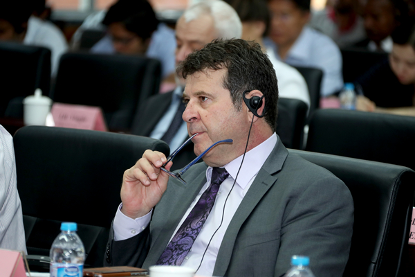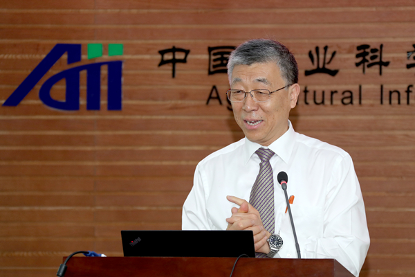Shaping Food Systems May Fight Obesity
The preliminary findings of a report on nutrition and food systems were presented at an international seminar on sustainable food security and nutrition under agriculture transformation and urbanization on May 26.
According to the findings current social dietary patterns are changing and face serious challenges: growing demand, poor-quality of intake -- more sugar but fewer fruits and vegetables -- and expensive food supplies that may not be sustainable.

Doctor Patrick Caron, HLPE Chair, listens to a presentation on the seminar at CAAS on May 26. [Photo/CAAS]
Professor Jessica Fanzo, head of the High Level Panel of Experts (HLPE) project team that conducted the research, explained that climate change has reduced food supplies.
What's worse, increasing population pressure and urbanization have led to a decrease of cultivated areas, which results in even lower food production and unhealthy population conditions.
One example of such a condition is obesity, which, although perhaps easily ignored, is increasingly prevalent according to the World Health Organization.
China is now 57 percent urbanized, a figure that will reach 70 percent by 2050.
"Urbanization changes nutrition. When a country gets wealthier, it urbanizes and when a country urbanizes, (its people) get fatter," Professor Fanzo said.
Such problems have appeared not only in China but also in the rest of the world. "No country has been able to stop the obesity trend from going up," she added.
To help people fight obesity and re-gain a healthy and nutritious diet, Professor Fanzo suggests "Food system can shape consumer demands."
"We need to keep in mind that we have trade, agriculture and subsidies policies and we have the power to shape supply," she stressed.
At the seminar, Zhang Lubiao, deputy-director general of the Department of International Cooperation, Ministry of Agriculture, suggested the importance of innovative technologies for agriculture development.
"Food production will not meet demand by 2035 or 2050 without advanced technology," Zhang said, "We also need innovations in management. Without investment, we can’t make agriculture big."
He also mentioned that China has been devoted to food security and nutrition advancement and will keep offering investment, training and extension of agriculture demonstration centers to other developing countries.
Doctor Wang Ren, assistant director general of Food and Agriculture Organization (FAO), highlighted the importance of innovation to address the challenges of urbanization, sustainable management of natural resources and climate change.

Doctor Wang Ren, FAO assistant director general, delivers a speech on the seminar on May 26. [Photo/CAAS]
Also present at the seminar were Doctor Patrick Caron, HLPE Chair; Doctor Nie Fengying, deputy director of the Agricultural Information Institute of CAAS; Doctor Chen Mengshan, director of the National Food Security and Nutrition Consultant Council and Chairman of CAAS; Doctor Wu Kongming, vice president of CAAS; and Courtney Paisley, YPARD Global Coordinator.
The seminar was held during celebrations for the 60th anniversary of the Chinese Academy of Agricultural Sciences (CAAS) and was chaired by Mei Fangquan, member of the Committee on World Food Security and of the Center for International Agricultural Research (CIAR).
CIAR, established by CAAS in 2016, is an open platform to internationally promote CAAS's technology through trans-sectional cooperation and interdisciplinary research on major scientific innovations.

Mei Fangquan, member of the Committee on World Food Security and of CIAR, introduces attendees of the seminar on May 26. [Photo/CAAS]




